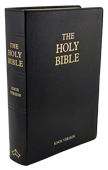The Holy Bible – Knox Translation
The Book of Job
|
Chapter 24
|
1
Since he, who is omnipotent, determines every event, how is it that those who know him wait in vain for his doom to fall?✻
2
Here are men that alter their neighbour’s landmark, drive stolen cattle to pasture,
3
rob the orphan of his ass, take the widow’s ox in pawn,
4
shoulder the poor aside, conspire to oppress the friendless;
5
leave others to make their living as best they may, like the wild ass in the desert, waking betimes to scrape food for hungry mouths at home.
6
Reap they the field that is none of theirs, strip they the vineyard wrongfully seized from its owner;
7
let men go bare, their garments snatched away,
8
defenceless against cold and rain on the mountain-side, so that they are fain to hug the rocks for lack of shelter.
9
Their violence robs the helpless children, despoils the poor and simple;
10
back and side must go bare, and never a stalk left for hungry men to glean;
11
nor any vintager of theirs lies down between the rows at noon, but goes thirsty!✻
12
A cry goes up from the city streets, where wounded men lie groaning; tell me, does not God allow it to pass unheeded?✻
13
How they shun the light, these rebels who ignore God’s precepts, leave his paths untrodden!
14
The murderer must be stirring before daybreak, to catch his helpless prey, or prowl, as the thieves prowl, at night.
15
For darkness, too, the adulterer waits, no eye must scan his muffled features;
16
under cover of darkness he will break into the house, to keep the tryst made yesterday; no daylight for him.
17
To him, the first flush of dawn is death’s shadow; deep gloom is the sunshine he walks by.
18
Light as foam on the waters, nor light the doom, surely, that awaits him on earth; not for him the vineyard’s sunny slope!
19
Swift as snow melts under the noon-day heat, let his guilty soul pass to the grave,
20
unpitied, with worms for its boon-companions, forgotten, overthrown like an unfruitful tree!
21
The childless woman was his prey;✻ in vain the widow looked to him for mercy;
22
now, surely, God has pulled the tyrant down; firm he has stood, but now he despairs of life itself!
23
Time for repentance God gave him, by his pride misused, but ever on his doings kept a watchful eye;
24
now, their brief renown over, such men must pass, as all things pass, into the dust, be carried off, swept away like ears of corn!✻
25
But no, never the day comes! Who dares give me the lie, challenge me in God’s sight?✻


